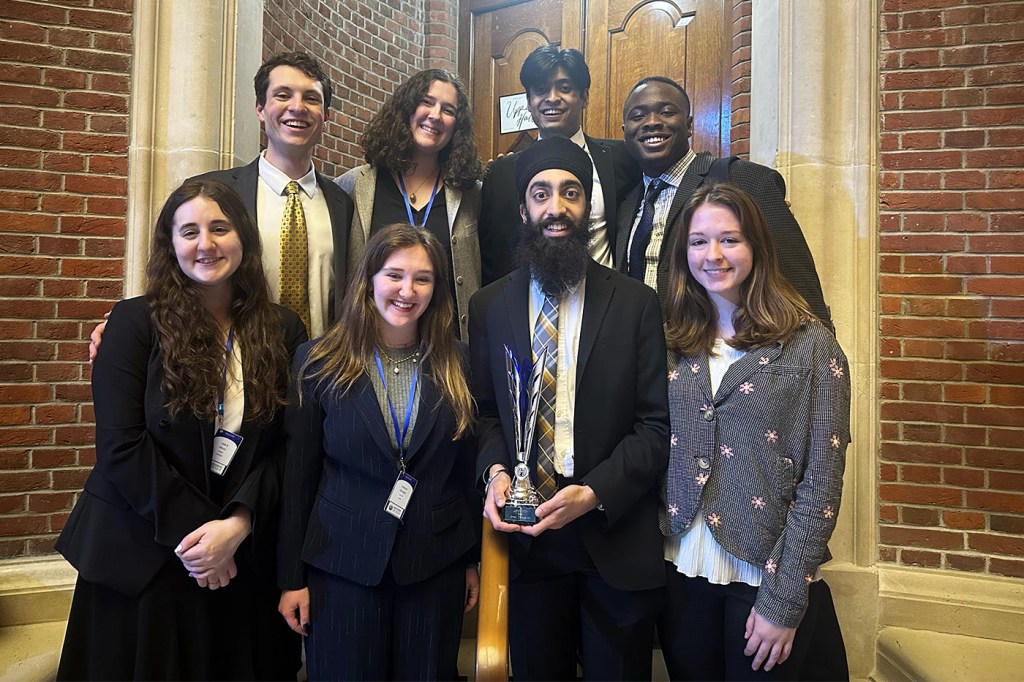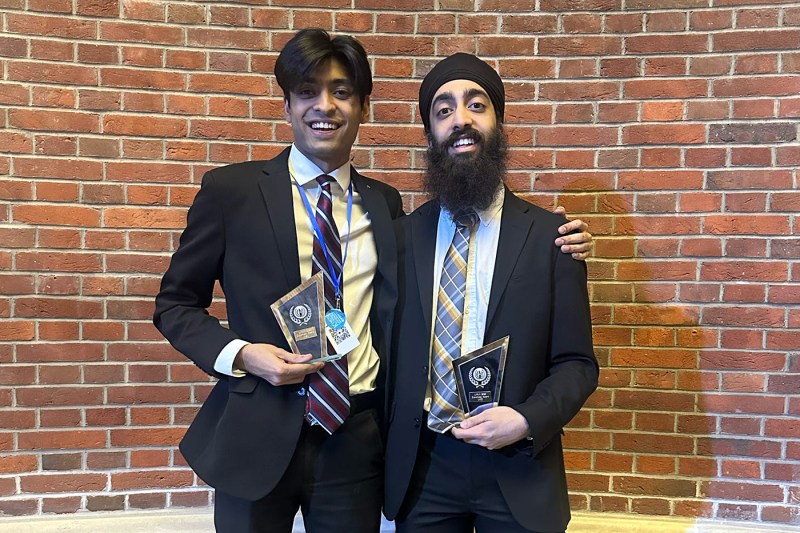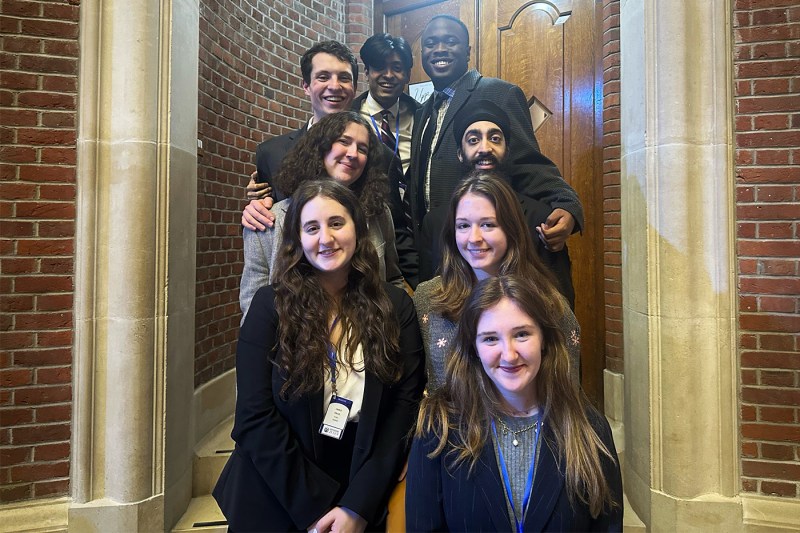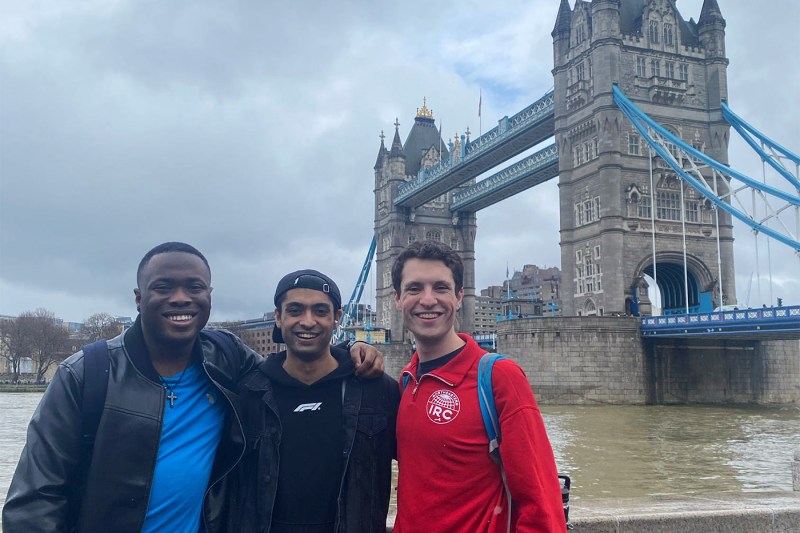Northeastern’s International Relations Council debate team finds success at Model UN conference in London
It’s hard to keep up with everything going on in the world, but these Northeastern students know how to regularly debate it in Model UN.

Imagine debating how to prevent armed conflict at an international level. Now imagine you have to do so taking the stance of Russia, a country that’s not known for its mediation strategies.
This is the stance Northeastern University International Relations Council President Aayush Joshipura had to take in a recent Model UN conference the team competed in in London.
It was a challenge, Joshipura said, going up against students studying international policy, but he ultimately won an award for his performance during the model Security Council debate.
“It was a very unique experience, given the political climate,” Joshipura said. “But what was really enjoyable and interesting about it was it kind of forces you to think on your feet. … Oftentimes, countries would come at us with very opposite policies and the challenge was navigating through that opposition, finding ways to compromise, and really maintaining the key tenets of Russian policy without being aggressive and confrontational.
“Our biggest challenge was figuring out a way to represent Russia that doesn’t get us slandered. Obviously, we don’t agree with the majority, if not all, of Russia’s foreign policy, but part of the experience is immersing yourself in whatever country you’re playing. The way we dealt with it was also to somewhat dilute some of the more aggressive stances.”



The award was one of two Northeastern’s International Relations Council won during the Model UN Conference. The Boston-based team also won Best Small Delegation for their collective performance during the conference.
The International Relations Council spends hours debating issues that affect Europe. But this was their first chance to travel to Europe as a team to debate against delegations from Belgium, France, the United Kingdom and Spain.
“The conference we went to is very huge in Europe, but it was more monumental for us because it’s the first time we’ve really gone across the pond,” Joshipura said. “We haven’t as a club really explored the opportunity yet, and being able to compete overseas was something that appealed to us. It was great to come out with the victory and success.”
Northeastern’s International Relations Council is more than just a Model UN group, but a collective that also includes a Model Arab League and Model NATO. Students get a chance to participate in competitions for all three of these leagues and meet every Wednesday to practice their debating over topics in the news that their vice president picks for daily discussion.
At the London conference, the students got the chance to debate on different councils and from different countries’ standpoints.
Featured Posts
In participating in a European conference, the International Relations Council got the chance to debate against students who actually come from some of the countries the group might argue as, exposing them to different viewpoints.
“I am really ecstatic to be able to potentially do more international conferences,” added Nasyve Beech, a third-year politics, philosophy and economics member who also went to London with the International Relations Council. “The model circuit in Europe is way different than the model circuit in America, so getting used to a different sort of diplomacy was a great opportunity for us and we really want to just try to encourage it more. … What I really enjoyed is that at the end, they’re all really friendly with each other. There’s this diplomatic side that comes out, but they’re able to go have fun and go to dinner with each other afterwards. It’s inspiring to see people really dedicate themselves to these practices and methods.”
To prepare for a debate, International Relations Council members do research to understand not just a country’s stances, but where success has been found in the past and what can be done to improve the issue. They found out their assignments for this conference a week or two ahead of time, but sometimes they have months to research and prepare stances on certain topics.
The London conference wasn’t the first time Northeastern’s International Relations Council faced a challenging debate stance: Joshipura and Beech once had to represent Libya in a debate about dictatorship at a conference in Washington, D.C. Since Libya is under a dictatorship, they had to take that stance.
“A lot of the stances that we took were clearly unpopular in the room, but luckily the committee was very large, so we were able to find nations that shared Libya’s policy on those issues,” Joshipura said. “We had to deal with conflicting stances, but Nasyve and I played Libya in a way that was a little more cooperative and diluted a lot of the more aggressive stances. … It just strikes that balance between wanting to faithfully represent your country, but wanting to do so in a way that isn’t propagating harmful sentiments (and) foster community cooperation.”
Luckily, the team’s weekly practices help prepare members for situations like these.
“You can do a lot of research before a conference, but when you’re there just talking to other students and delegates, anything kind of flies,” Joshipura added. “You have to (find) ways to think on your feet and work with people…because you’re likely not going to be able to get everything that your country wants. … The IRC is a great intersection between something that’s professional and educational because we’re debating serious policy.”





